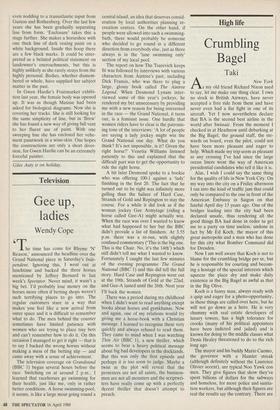Television
Gee up, ladies
Wendy Cope
The time has come for Rhyme 'N' Reason,' announced the headline over the Grand National piece in Saturday's Inde- pendent. Ignoring this, I went out at lunchtime and backed the three horses mentioned by Jeffrey Bernard in last week's Spectator. Never mind, it wasn't a big bet. I'd probably lose money on the horses more often if betting shops weren't such terrifying places to go into. The regular customers stare in a way that makes you feel like a new arrival from outer space and it is difficult to remember what to do. The men behind the counter sometimes have limited patience with women who are trying to place tiny bets and can't remember how to do it. On this occasion I managed to get it right — that is to say I backed the wrong horses without making a mess of the betting slip — and came away with a sense of achievement.
The television coverage on Grandstand (BBC 1) began several hours before the race. Switching on at around 2 p.m., I learned that racehorses go swimming for their health, just like me, only in rather better conditions. A horse swimming-pool, it seems, is like a large moat going round a central island, an idea that deserves consid- eration by local authorities planning re- creation centres. On the other hand, if people were allowed into such a swimming- bath, there would probably be someone who decided to go round in a different direction from everybody else, just as there always is in the 'lane swimming only' section of my local pool.
The report on how The Tsarevich keeps fit was followed by interviews with various characters from Aintree's past, including Dick Francis, who was there to plug a large, glossy book called The Aintree Legend. When Desmond Lynam inter- viewed some of this year's jockeys, he rendered my bet unnecessary by providing me with a new reason for being interested in the race — the Grand National, it turns out, is a feminist issue. One hurdle that women riders have to clear is the patronis- ing tone of the interviews: 'A lot of people are saying a lady jockey might win the Grand National one day. What do you think? It's not impossible, is it? Given the right horse?' Venetia Williams listened patiently to this and explained that the difficult part was to get the opportunity to ride the right horse.
A bit later Desmond spoke to a bookie who was offering 100-1 against a 'lady' finishing in the first 20. The fact that he turned out to be right was infinitely more galling than the failure of Hard Case, Strands of Gold and Repington to stay the course. For a while it did look as if the woman jockey Gee Armytage (riding a horse called Gee-A) might actually win. When the race was over I wanted to know what had happened to her but the BBC didn't provide a list of finishers. At 3.55 p.m. there was a re-run, with slightly confused commentary (`This is the big one. This is the Chair. No, it's the 14th') which still didn't tell me what I wanted to know. Fortunately I caught the last few minutes of the evening programme The Grand National (BBC 1) and this did tell the full story. Hard Case and Repington went out at the 19th, Strands of Gold at the 22nd, and Gee-A lasted until the 26th. Next year I'll back the women.
There was a period during my childhood when I didn't want to read anything except books about horses and gymkhanas. Now and again, one of my relations would try giving me a horse-book with a Christian message. I learned to recognise these very quickly and always refused to read them. They came to mind when I was watching Thin Air (BBC 1), a new thriller, which seems to bear a heavy political message about big bad developers in the docklands. But this was only the first episode and perhaps it is too soon to judge. Maybe a twist in the plot will reveal that the protesters are not all saints, the business- men are not all monsters and the scriptwri- ters have really come up with a perfectly decent thriller that doesn't attempt to preach.






























































 Previous page
Previous page